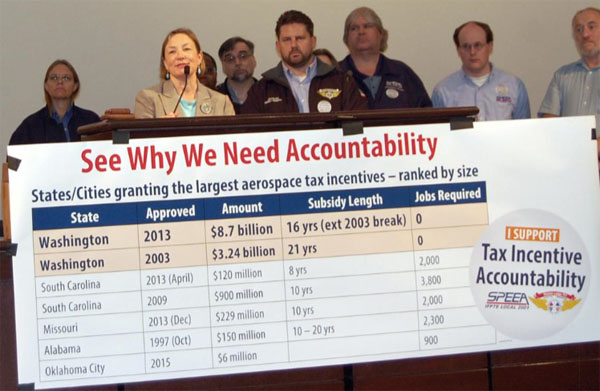OPINION
As Boeing cuts jobs here, we’re paying to boost its stock price
By JOHN BURBANK
(May 4, 2016) — Last week Boeing reported that it had skipped out on $305 million in taxes in 2015.
Back in 2013, Legislature enacted a special Boeing exemption from business taxes. The legislative intent was to keep jobs in Washington. But that was not written into the tax exemption bill. So in spite of, or maybe because of, the tax exemption, Boeing has shed over 10 percent of its workforce since 2012, shifting more than 10,000 jobs out of Washington state.
State Rep. June Robinson (D-Everett) has proposed a solution. She introduced legislation to make this tax exemption dependent on actual jobs. Any loss of jobs since December 2013 would decrease the allowable exemption. So Boeing’s tax exemption would have been cut in half now, because in the past three years, over 5,000 Boeing jobs have been disappeared. It is a small common-sense step forward. But the Legislature refused to take it up.
Perhaps that is because some legislators believe that the tax incentives have proved justified. One legislative leader stated, “We all feel frustration with short-term layoffs,” he said. But taking a “long view,” landing the 777X and the carbon-fiber industry here “is the future of aviation” and “makes that package worthwhile.”
But these are permanent, not short-term, layoffs with Boeing investing in “centers of excellence” around the world. Was it this $305 million tax avoidance that made Boeing decide to build the 777X here? That was three-tenths of a percent of Boeing’s revenue in 2015, which exceeded $96.1 billion. Boeing spent $6.8 billion just buying back Boeing shares. The tax exemption amounted to 4 percent of this buyback program, which had nothing to do with positioning Boeing in Washington state.
Boeing’s business decision to place the 777X here was based on the factors of production, mainly that the Puget Sound area is host to the world’s best and most concentrated grouping of mechanical, technical, and engineering human capital for aerospace production. In other words, we have the educated, trained and skilled workforce and the state is funding a pipeline of trained workers for future aerospace work. That is what interests Boeing.
If they can position work outside of Washington, they will. They have no commitment to our state. That ended when McDonnell Douglas took over Boeing 20 years ago. No longer was Boeing a northwest company with social commitments and production facilities dedicated to Washington state. Instead, it could be a rogue multinational company, and use Washington’s workers and intellectual capital to seed other production in other states and countries.
You might note that other states are giving Boeing tax exemptions as well. South Carolina, for example, gave Boeing $120 million in 2013 to offset Boeing’s expansion costs there. The South Carolina deal was dependent on the creation of 2,000 jobs. The $305 million Boeing saved in 2015 in our state was part of a $8.7 billion 16-year tax exemption deal. And in contrast to South Carolina, the Washington state deal appears to be dependent on job destruction!
 How does this $305 million compared to the cost overruns of the 787? Those overruns amounted to $25 billion, or 84 times Boeing’s 2015. They were the result of Boeing shifting 787 production to other states and other countries. But the workers and managers in those places just couldn’t meet the exact specifications needed to create and fly the 787. So production and repair was shipped back to Washington state, where highly trained and skilled workers put the pieces back together again.
How does this $305 million compared to the cost overruns of the 787? Those overruns amounted to $25 billion, or 84 times Boeing’s 2015. They were the result of Boeing shifting 787 production to other states and other countries. But the workers and managers in those places just couldn’t meet the exact specifications needed to create and fly the 787. So production and repair was shipped back to Washington state, where highly trained and skilled workers put the pieces back together again.
What was Boeing’s next move? Accelerate production in South Carolina, having the Puget Sound workforce train the South Carolina workforce to build the 787 correctly, and on time. This means that Boeing will slowly drain jobs out of our state, while also receiving a multi-billion dollar tax break over the next eight years.
Legislative consideration is usually a slow and deliberative process, for good reason. Legislators want to be able to consider all the intended and unintended consequences of their law-making. But the Boeing package was pushed through in a special two-day session, called for just that reason and paid for by the taxpayers of our state. All just to give Boeing a gift.
What could that $305 million have paid for? Compensation for 4,000 teachers. Or community college tuition for 80,000 students. But instead it went to bulk up the stock buyback for Boeing shareholders. That is a disservice to the citizens of this state.

John Burbank is the executive director and founder of the Economic Opportunity Institute in Seattle. John can be reached at john@eoionline.org.






